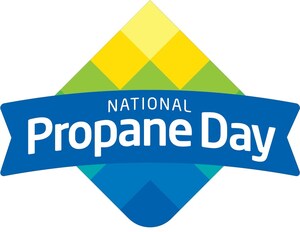
WASHINGTON, Jan. 26, 2021 /PRNewswire/ -- A new comparative analysis out today analyzes the carbon footprint of medium-duty and heavy-duty (MD-HD) engine vehicles powered by propane and electricity. The analysis, Decarbonization of MD-HD Vehicles with Propane, found that propane-fueled MD-HD internal combustion engine vehicles provide a lower carbon footprint solution in 38 U.S. states and Washington, D.C., when compared to MD-HD electric vehicles (EVs) charged using the electrical grid.
Fifteen states and Washington, D.C., have proposed full electrification of medium- and heavy-duty trucks by 2050 with a target of 30 percent "zero-emission" vehicle sales by 2030. The rationale behind the proposals is based on the dubious assumption that the electrical grid will be fully decarbonized by that time. Likewise, policy based on exhaust carbon dioxide (CO2eq) emissions alone as opposed to life-cycle analysis results misses the full picture. As a result, policy proposals today conflate the promise of electrification with actual decarbonization.
The comparative analysis also reveals that MD-HD vehicles powered by renewable propane provide a lower carbon footprint solution in every U.S. state except Vermont where electricity is generated by, and imported from, Canadian hydroelectric power plants. Renewable propane is derived from sources such as beef fats, vegetable oils, grease residue, and other biomass feedstocks.
Moreover, the analysis shows that decarbonization can be accelerated by adopting propane as the fuel of choice for MD-HD vehicles. The conclusion is supported by a life-cycle analysis of equivalent CO2eq emissions between electric and propane-fueled vehicles across the U.S. using CARB carbon intensity values along with a powertrain efficiency analysis.
"It's often assumed that full electrification of all sectors will lead to their full decarbonization, but little thought on how electricity is currently generated, stored, transmitted, and consumed has been considered," said the author Dr. Gokul Vishwanathan, director of research & sustainability at the Propane Education & Research Council. "While a fully renewable-based electric grid is not feasible anytime soon, propane is an effective solution today for accelerating decarbonization of transportation and other energy sectors."
The comparative analysis presented the following decarbonization recommendations:
- All 50 states should aggressively invest resources in incentivizing renewable fuels.
- Federal government agencies, particularly the Department of Energy, should aggressively invest in various parallel pathways for renewable and synthetic fuel production to ensure supply.
- The U.S. should aggressively pursue immediately available decarbonization efforts using alternative fuels such as propane and dimethyl ether (DME) rather than wait on grid infrastructure improvements that are decades away from realization.
About PERC: The Propane Education & Research Council is a nonprofit that provides leading propane safety and training programs and invests in research and development of new propane-powered technologies. PERC is operated and funded by the propane industry. For more information, visit Propane.com.
Contact: |
David Gibbs representing PERC |
SOURCE Propane Education & Research Council







Share this article